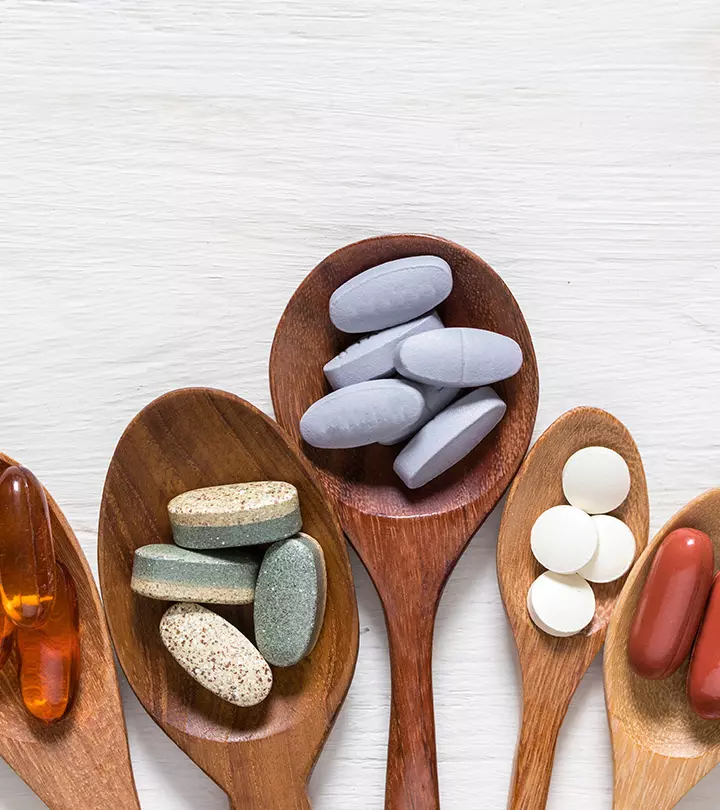
Image: Shutterstock
Can dietary supplements boost your family’s immunity? Time for a Reality check!
Immunity and its importance for human survival need no explanation. But the pandemic has “reiterated and accentuated” it pervasively. As a result, there has been a staggering increase in purchases of dietary supplements, which claim to boost immunity and protect against viral infections.
According to an online cross-sectional survey, individual dietary supplement use before the pandemic in Asia and America was 29.5% and 40.6%. But after the pandemic, these figures rose to 71.9% and 75.7%, respectively (1). This stark rise in supplement use might look obvious, but it also raises a pertinent question – can dietary supplements boost immunity?
Answering this question is crucial to help consumers make informed choices and avert possible supplement overuse in the Covid aftermath.
Let’s see what science has to say.
Can Dietary Supplements Boost Immunity?
Currently, there’s no conclusive scientific evidence that dietary supplements can improve or boost a healthy individual’s immunity (2). In fact, experts claim that “immunity-boosting” is a misconception, and most supplements that healthy people take to boost their immune response don’t affect their immune systems (3).
It’s so because the immune system is intricate, consisting of several factors, such as antibodies and lymphocytes. No one food or nutrient can boost these factors and make immunity robust. Instead, it’s the well-balanced diet and healthy lifestyle practices, such as sound sleep, reduced stress, and exercise, that compound to make the difference.
So does this mean dietary supplements are entirely useless? – Well, not exactly.
Who Should Take Dietary Supplements?
Nutrient deficiency in individuals can lower immunity, raising infection risk. In such cases, dietary supplements fill the nutritional gaps and help strengthen the immune system (4). However, if a person has no nutritional deficiency, supplement use is technically “ineffectual.”
Yet, during Covid, the use of dietary supplements as a preventive care measure grew multifold. Apparently, most supplement purchases were driven by random recommendations or product marketing and not doctor’s consultation (5).
The Covid Fear
After Covid-19’s first wave, exigency for treatment was conspicuous. However, no definitive treatment was available, and the mortality rates were soaring worldwide. It’s then that healthcare professionals started prescribing dietary supplements, such as zinc, vitamin D, and vitamin C, routinely to support immunity.
The most plausible explanation was that these supplements had a long track of safe use, and their use in proper immune system functioning and reduction of the infection risk was well established (6). Hence, the thinking was why not try them to treat and prevent SARS-COV2.
While dietary supplement use as an adjunct therapy to support recovery in Covid-19 patients proved helpful, its safety and efficacy in preventing the infection are still under research (7). Yet, cashing on the Covid fear, some nutraceutical brands marketed nutritional supplements as a “necessity” for everyone to “boost their immune system (8).”
The unguided use of dietary supplements across age groups began escalating. Soon after which the reports of side-effects caused by the dietary supplement overuse or abuse started making rounds.
Here’s what the results of a consumer survey by the Council for Responsible Nutrition (CRN) show. Multivitamins, vitamin C, and vitamin D supplements saw the highest increase in intake during Covid-19 (9).

Image: Council For Responsible Nutrition
Supplement Abuse
Supplement abuse means consuming supplements in higher doses than needed (megadoses) or consuming supplements too frequently than suggested. In most cases, overuse or abuse happens due to unguided supplement use that can have detrimental effects. For instance, zinc overuse possibly resulting in mucormycosis (black fungus) (10).
Similar to this, supplement abuse can raise short and long-term issues, including (6):
- side effects, such as upset stomach and allergic reactions
- possible drug interaction which can affect the kidney and liver
- overconsumption of a nutrient, which can lead to its nutrient excess and even toxicity over time
- overstimulation of the immune system, which can lead to autoinflammatory and autoimmune diseases, such as arthritis and allergies, in the long run
Since self-supplementation can jeopardize one’s health, discussing supplement use with an expert or healthcare professional is vital. An expert will tell you if you need a supplement and then suggest an age-appropriate dosage based on factors, including your medical condition.
So should you take supplements or not?
Experts, time and again, have noted that most healthy individuals can meet their nutrient needs from a well-balanced diet (11). And to strengthen immunity, a combined approach of adopting healthy lifestyle practices, such as healthy eating, managing stress, proper sleep, and exercising, can help.
Following these practices to strengthen immunity is a gradual process that doesn’t happen overnight or just a few days. It takes time depending on several factors, such as an individual’s overall health. Hence, one should stay persistent with their efforts. If nutritional insufficiency is suspected or confirmed, one should discuss supplement use with a doctor.
The outbreak of Covid-19 has caused people to pay increased attention to their health and well-being to avoid getting affected by the virus. There have also been claims that including dietary supplements might help prevent or deal with the virus. But that is not the case. No studies or doctors advise taking dietary supplements to reduce your chances of contracting covid. Thus, it s advised that one should follow the guidelines released by the authorities regarding wearing masks, maintaining social distancing, and getting their dose of the vaccine (12).
References
- Elif Aysin and Murat Urhan; (2021); Dramatic Increase in Dietary Supplement Use During Covid-19
https://academic.oup.com/cdn/article/5/Supplement_2/207/6293090 - Can supplements help boost your immune system?.
https://www.health.harvard.edu/staying-healthy/can-supplements-help-boost-your-immune-system - Can You Really Boost Your Immune System?.
https://www.cedars-sinai.org/blog/boosting-your-immune-system.html - Should You Take Dietary Supplements?.
https://newsinhealth.nih.gov/2013/08/should-you-take-dietary-supplements - Kathleen K. Adams et al; (2020); Myth Busters: Dietary Supplements and COVID-19.
https://journals.sagepub.com/doi/10.1177/1060028020928052 - Do vitamin D, zinc, and other supplements help prevent COVID-19 or hasten healing?.
https://www.health.harvard.edu/blog/do-vitamin-d-zinc-and-other-supplements-help-prevent-covid-19-or-hasten-healing-2021040522310 - Dietary Supplements in the Time of COVID-19.
https://ods.od.nih.gov/factsheets/COVID19-HealthProfessional/ - Ronan Lordan et al; (2021); Dietary Supplements and Nutraceuticals under Investigation for COVID-19 Prevention and Treatment.
https://journals.asm.org/doi/pdf/10.1128/mSystems.00122-21 - Dietary Supplement Usage Up Dramatically During Pandemic, New Ipsos-CRN Survey Shows.
https://www.crnusa.org/newsroom/dietary-supplement-usage-dramatically-during-pandemic-new-ipsos-crn-survey-shows - Sumanth Gandra et. al; (2021); The “Black Fungus” in India: The Emerging Syndemic of COVID-19–Associated Mucormycosis.
https://www.acpjournals.org/doi/10.7326/M21-2354 - Do you need a daily supplement?.
https://www.health.harvard.edu/staying-healthy/do-you-need-a-daily-supplement - Coronavirus disease (COVID-19).
https://www.who.int/health-topics/coronavirus#tab=tab_2
Community Experiences
Join the conversation and become a part of our nurturing community! Share your stories, experiences, and insights to connect with fellow parents.
Read full bio of Swati Patwal













